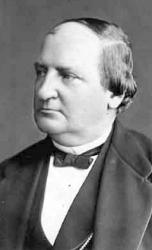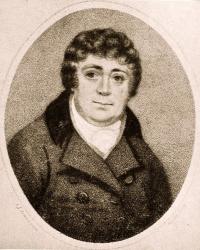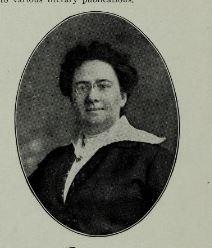Planning worship?
Check out our sister site, ZeteoSearch.org,
for 20+ additional resources related to your search.
- |
User Links
Person Results
‹ Return to hymnal







Export as CSV
Franz Abt

1819 - 1885 Hymnal Number: 104 Composer of "[Over the stars there is rest]" in Jubilate Franz Abt, born Dec. 21, 1819 at Eilenburg in the Prussian provinces of Saxony. His father was a musician and clergyman of the Lutheran Church. Franz studied music at Leipsic, and became known as a song-writer in 1838. In September, 1841, he married, and was leader of the orchesta at the Zuric theatre; became a teacher in 1842, but was litle known until his song "When the Swallows Homeward fly" carried his name to all parts of the civilized world. In 1865 was concert-master at Brunswick, and conducted the great festival at Dresden. He came to the United States in 1872, and was present at teh Peace Jubilee, Boston, where he directed the performance of some of his own music, arriving in New York May w, wher a testimonial concert was given for his benefit at Steinway Hall, May 18. He was received at Philadelphia by the German societies, with torch-light processions and cannonade, May 15, 1872.
A Dictionary of Musical Information by John W. Moore, Boston: Oliver, Ditson & Company, 1876
Franz Abt
A. H. Ackley

1887 - 1960 Person Name: A. H. A. Hymnal Number: 64 Author of "When the World Forgets" in Jubilate Alfred Henry Ackley was born 21 January 1887 in Spring Hill, Pennsylvania. He was the youngest son of Stanley Frank Ackley and the younger brother of B. D. Ackley. His father taught him music and he also studied at the Royal Academy of Music in London. He graduated from Westminster Theological Seminary in Maryland and was ordained as a Presbyterian minister in 1914. He served churches in Pennsylvania and California. He also worked with the Billy Sunday and Homer Rodeheaver evangelist team and for Homer Rodeheaver's publishing company. He wrote around 1500 hymns. He died 3 July 1960 in Los Angeles.
Dianne Shapiro (from ackleygenealogy.com by Ed Ackley and Allen C. Ackley)
A. H. Ackley
B. D. Ackley

1872 - 1958 Hymnal Number: 44 Composer of "[Once my way was dark and dreary]" in Jubilate Bentley DeForrest Ackley was born 27 September 1872 in Spring Hill, Pennsylvania. He was the oldest son of Stanley Frank Ackley and the brother of A. H. Ackley. In his early years, he traveled with his father and his father's band. He learned to play several musical instruments. By the age of 16, after the family had moved to New York, he began to play the organ for churches. He married Bessie Hill Morley on 20 December 1893. In 1907 he joined the Billy Sunday and Homer Rodeheaver evangelist team as secretary/pianist. He worked for and traveled with the Billy Sunday organization for 8 years. He also worked as an editor for the Homer Rodeheaver publishing company. He composed more than 3000 tunes. He died 3 September 1958 in Winona Hills, Indiana at the age of 85 and is buried in Oakwood Cemetery, Warsaw, Indiana, near his friend Homer Rodeheaver.
Dianne Shapiro (from ackleyfamilygenealogy.com by Ed Ackley and Allen C. Ackley)
B. D. Ackley
Adam Geibel Music Co.
Person Name: Adam Geibel Music Editor of "" in Jubilate Philadelphia
Adam Geibel Music Co.
Sarah Flower Adams

1805 - 1848 Person Name: Sarah F. Adams Hymnal Number: 203 Author of "Nearer, My God, to Thee" in Jubilate Adams, Sarah, nee Flower. born at Harlow, Essex, Feb. 22nd, 1805; died in London, Aug. 14, 1848, and was buried at Harlow, Aug. 21,1848. She was the younger daughter of Mr. Benjamin Flower, editor and proprietor, of The Cambridge Intelligencer; and was married, in 1834, to William B. Adams, a civil engineer. In 1841 she published Vivia Perpetua, a dramatic poem dealing with the conflict of heathenism and Christianity, in which Vivia Perpetua suffered martyrdom; and in 1845, The Flock at the Fountain; a catechism and hymns for children. As a member of the congregation of the Rev. W. J. Fox, an Unitarian minister in London, she contributed 13 hymns to the Hymns and Anthems, published by C. Fox, Lond., in 1841, for use in his chapel. Of these hymns the most widely known are— "Nearer,my God,to Thee," and "He sendeth sun, He sendeth shower." The remaining eleven, most of which have come into common use, more especially in America, are:—
Creator Spirit! Thou the first. Holy Spirit.
Darkness shrouded Calvary. Good Friday.
Gently fall the dews of eve. Evening.
Go, and watch the Autumn leaves. Autumn.
O hallowed memories of the past. Memories.
O human heart! thou hast a song. Praise.
O I would sing a song of praise. Praise.
O Love! thou makest all things even. Love.
Part in Peace! is day before us? Close of Service.
Sing to the Lord! for His mercies are sure. Praise.
The mourners came at break of day. Easter.
Mrs. Adams also contributed to Novello's musical edition of Songs for the Months, n. d. Nearly all of the above hymns are found in the Unitarian collections of Great Britain, and America. In Martineau's Hymns of Praise & Prayer, 1873, No. 389, there is a rendering by her from Fenelon: —" Living or dying, Lord, I would be Thine." It appeared in the Hymns and Anthems, 1841.
-John Julian, Dictionary of Hymnology (1907)
Sarah Flower Adams
Anonymous
Person Name: Anon. Hymnal Number: 79 Author of "There is no Name so Sweet on Earth" in Jubilate In some hymnals, the editors noted that a hymn's author is unknown to them, and so this artificial "person" entry is used to reflect that fact. Obviously, the hymns attributed to "Author Unknown" "Unknown" or "Anonymous" could have been written by many people over a span of many centuries.
Anonymous
Samuel Arnold

1740 - 1802 Hymnal Number: 225 Composer of "[O say, can you see, by the dawn's early light]" in Jubilate Dr. Samuel Arnold, an English musician and composer; born in London, Aug. 10, 1739; composed for the theatre, the church, and also oratorio music; succeeded Dr. Nares as organist; died at Westminster, Oct. 22, 1802.
A Dictionary of Musical Information by John W. Moore, Boston: Oliver, Ditson & Company, 1876
Samuel Arnold
Ludwig van Beethoven

1770 - 1827 Person Name: L. Van Beethoven Hymnal Number: 137 Composer of "[Have you heard the whisper of the breeze?]" in Jubilate A giant in the history of music, Ludwig van Beethoven (b. Bonn, Germany, 1770; d. Vienna, Austria, 1827) progressed from early musical promise to worldwide, lasting fame. By the age of fourteen he was an accomplished viola and organ player, but he became famous primarily because of his compositions, including nine symphonies, eleven overtures, thirty piano sonatas, sixteen string quartets, the Mass in C, and the Missa Solemnis. He wrote no music for congregational use, but various arrangers adapted some of his musical themes as hymn tunes; the most famous of these is ODE TO JOY from the Ninth Symphony. Although it would appear that the great calamity of Beethoven's life was his loss of hearing, which turned to total deafness during the last decade of his life, he composed his greatest works during this period.
Bert Polman
Ludwig van Beethoven
Birdie Bell

Person Name: C. Louise Bell Hymnal Number: 167 Author of "At the End of the Road " in Jubilate C. Louise Bell, also known a Birdie Bell, was born, raised and lived in New York city. She began writing hymns when she was sixteen years old. She is the author of more than 500 hymns, 200 religious poems, and 200 Christmas and Easter lyrics, as well as short stories, and articles. She wrote under the name of Birdie Bell, which is what her family called her.
Dianne Shapiro, from "The Singers and Their Songs: sketches of living gospel hymn writers" by Charles Hutchinson Gabriel (Chicago: The Rodeheaver Company, 1916)
Birdie Bell
Bernard, of Cluny
1100 - 1199 Person Name: Bernard of Cluny Hymnal Number: 63 Author of "Jerusalem, the Golden" in Jubilate Bernard of Morlaix, or of Cluny, for he is equally well known by both titles, was an Englishman by extraction, both his parents being natives of this country. He was b., however, in France very early in the 12th cent, at Morlaix, Bretagne. Little or nothing is known of his life, beyond the fact that he entered the Abbey of Cluny, of which at that time Peter the Venerable, who filled the post from 1122 to 1156, was the head. There, so far as we know, he spent his whole after-life, and there he probably died, though the exact date of his death, as well as of his birth is unrecorded. The Abbey of Cluny was at that period at the zenith of its wealth and fame. Its buildings, especially its church (which was unequalled by any in France); the services therein, renowned for the elaborate order of their ritual; and its community, the most numerous of any like institution, gave it a position and an influence, such as no other monastery, perhaps, ever reached. Everything about it was splendid, almost luxurious. It was amid such surroundings that Bernard of Cluny spent his leisure hours in composing that wondrous satire against the vices and follies of his age, which has supplied—and it is the only satire that ever did so—some of the most widely known and admired hymns to the Church of today. His poem De Contemptu Mundi remains as an imperishable monument of an author of whom we know little besides except his name, and that a name overshadowed in his own day and in ours by his more illustrious contemporary and namesake, the saintly Abbot of Clairvaux.
The poem itself consists of about 3000 lines in a meter which is technically known as Leonini Cristati Trilices Dactylici, or more familiarly—to use Dr. Neale's description in his Mediaeval Hymns, p. 69—" it is a dactylic hexameter, divided into three parts, between which a caesura is inadmissible. The hexameter has a tailed rhyme, and feminine leonine rhyme between the two first clauses, thus :—
" Tune nova gloria, pectora sobria, clarificabit: Solvit enigmata, veraque sabbata, continuabit, Patria luminis, inscia turbinis, inscia litis, Cive replebitur, amplificabitur Israelitis."
The difficulty of writing at all, much more of writing a poem of such length in a metre of this description, will be as apparent to all readers of it, as it was to the writer himself, who attributes his successful accomplishment of his task entirely to the direct inspiration of the Spirit of God. "Non ego arroganter," he says in his preface, "sed omnino humiliter, et ob id audenter affirmaverim, quia nisi spiritus sapicntiae et intellectus mihi affuisset et afftuxisset, tarn difficili metro tarn longum opus con-texere non sustinuissem."
As to the character of the metre, on the other hand, opinions have widely differed, for while Dr. Neale, in his Mediaeval Hymns, speaks of its "majestic sweetness," and in his preface to the Rhythm of Bernard de Morlaix on the Celestial Country, says that it seems to him "one of the loveliest of mediaeval measures;" Archbishop Trench in his Sac. Lat. Poetry, 1873. p. 311, says "it must be confessed that" these dactylic hexameters "present as unattractive a garb for poetry to wear as can well be imagined;" and, a few lines further on, notes "the awkwardness and repulsiveness of the metre." The truth perhaps lies between these two very opposite criticisms. Without seeking to claim for the metre all that Dr. Neale is willing to attribute to it, it may be fairly said to be admirably adapted for the purpose to which it has been applied by Bernard, whose awe-stricken self-abasement as he contemplates in the spirit of the publican, “who would not so much as lift up his eyes unto heaven," the joys and the glory of the celestial country, or sorrowfully reviews the vices of his age, or solemnly denounces God's judgments on the reprobate, it eloquently pourtrays. So much is this the case, that the prevailing sentiment of the poem, that, viz., of an awful apprehension of the joys of heaven, the enormity of sin, and the terrors of hell, seems almost wholly lost in such translations as that of Dr. Neale. Beautiful as they are as hymns, "Brief life is here our portion," "Jerusalem the Golden," and their companion extracts from this great work, are far too jubilant to give any idea of the prevailing tone of the original. (See Hora Novissima.)
In the original poem of Bernard it should be noted that the same fault has been remarked by Archbishop Trench, Dean Stanley, and Dr. Neale, which may be given in the Archbishop's words as excusing at the same time both the want, which still exists, of a very close translation of any part, and of a complete and continuous rendering of the whole poem. "The poet," observes Archbishop Trench, "instead of advancing, eddies round and round his object, recurring again and again to that which he seemed thoroughly to have discussed and dismissed." Sac. Lat. Poetry, 1873, p. 311. On other grounds also, more especially the character of the vices which the author lashes, it is alike impossible to expect, and undesirable to obtain, a literal translation of the whole. We may well be content with what we already owe to it as additions to our stores of church-hymns.
-John Julian, Dictionary of Hymnology (1907)
==================
Bernard of Cluny, p. 137, i., is best described thus: his place of origin is quite uncertain. See the Catalogue of the Additional MSS. of the B. M. under No. 35091, where it is said that he was perhaps of Morlas in the Basses-Pyrenees, or of Morval in the Jura, but that there is nothing to connect him with Morlaix in Brittany. [Rev. James Mearns, M.A.]
--John Julian, Dictionary of Hymnology, New Supplement (1907)
Bernard, of Cluny


 My Starred Hymns
My Starred Hymns


